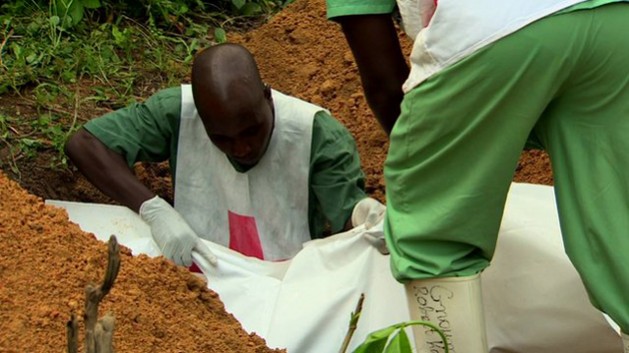Ebola outbreak: US experts to head to West Africa

3 August 2014 Last updated at 18:14 GMT

The BBC’s Tulip Mazumdar witnessed the burial of an Ebola patient
Ebola crisis
The US has announced plans to send at least 50 public health experts to West Africa to help fight the worst-ever outbreak of Ebola.
A senior US health official said the outbreak was out of control but insisted it could be stopped.
Ebola has claimed 728 lives in Guinea, Liberia and Sierra Leone this year. The current mortality rate is about 55%.
Meanwhile, an American doctor infected with the virus is improving in hospital after returning to the US from Liberia.
Dr Kent Brantly arrived at a military base in Georgia on Saturday before being driven to Emory University Hospital.

The aircraft chartered to transport the infected Americans can only carry one patient at a time
Another infected American, aid worker Nancy Writebol, is expected to arrive in the US soon.
The virus spreads through human contact with a sufferer’s bodily fluids.
Initial flu-like symptoms can lead to external haemorrhaging from areas like eyes and gums, and internal bleeding which can lead to organ failure.
‘Scary’ disease
Dr Thomas Frieden, director of the Centers for Disease Control and Prevention, announced the new US measures in an interview with ABC’s This Week.
“We do know how to stop Ebola. It’s old-fashioned plain and simple public health: find the patients, make sure they get treated, find their contacts, track them, educate people, do infection control in hospitals.”
The experts would arrive in West Africa within 30 days to fight what he called the “scary” disease.
He rejected fears that this would put more US citizens in harms way.
 Kent Brantly (right) insisted the only serum available go to a colleague
Kent Brantly (right) insisted the only serum available go to a colleague
“The single most important thing we can do to protect Americans is to stop this disease at the source in Africa” he said.
Special plane
The plane carrying Dr Brantly was outfitted with a special portable tent designed for transporting patients with highly infectious diseases.
The same aircraft is due to bring missionary Nancy Writebol from West Africa.
The hospital facility which will treat both patients is one of four in the US able to handle Ebola patients.
US officials say they are confident the patients can be treated without putting the public in any danger.
The National Institutes of Health in the US has said it will begin testing a possible Ebola vaccine in September.
Ebola since 1976


Dr Chan met the leaders of Guinea, Liberia and Sierra Leone to launch a new $100m (£59m) Ebola response plan.
The plan includes funding the deployment of hundreds more health care workers to affected countries.
“This meeting must mark a turning point in the outbreak response,” Dr Chan said at the summit in Guinea’s capital, Conakry.
“Cases are occurring in rural areas which are difficult to access, but also in densely populated capital cities.”
She said the outbreak was the deadliest and most widely spread, and had also demonstrated an ability to spread through air travel, unlike past outbreaks.

The spread of the virus is dominating the headlines in Liberia

Military vehicles in Liberia are displaying warnings and advice about Ebola to prevent panic over the spread of the virus
Separately, the Liberian government declared Friday a holiday to allow a huge sanitisation and chlorination exercise in government ministries and places of public gathering.
Information Minister Lewis Brown said “the intent is to let us come to the realisation that something is wrong and what is wrong is serious”.
Up to 30 Commonwealth Games athletes from Sierra Leone, meanwhile, are considering extending their stay in Glasgow amid fears over the Ebola virus.
Ebola virus disease (EVD)

- Symptoms include high fever, bleeding and central nervous system damage
- Fatality rate can reach 90%
- Incubation period is two to 21 days
- There is no vaccine or cure
- Supportive care such as rehydrating patients who have diarrhoea and vomiting can help recovery
- Fruit bats are considered to be virus’ natural host
Ebola crisis
Features and analysis

-
Why so dangerous
With 729 deaths in an outbreak of the Ebola virus in West Africa, BBC News asks what the disease is and how it can be stopped.
-
On the front line
-
Virus detective
-
Ebola voices
-
‘Like space invaders’
-
Ebola Q&A
-
‘No handshakes, no sex’
-
I caught Ebola and survived
-
In pictures: Battling Ebola
Video
-
In 60 seconds: What is Ebola? Watch
What you need to know about the dangers of the virus
-
The challenge of Ebola Watch
-
Four-month-old laid to rest Watch
-
‘I survived Ebola outbreak’ Watch
-
Inside a testing laboratory Watch
Related Stories
-
04 AUGUST 2014, UK
-
02 AUGUST 2014, US & CANADA
-
01 AUGUST 2014, AFRICA
-
29 JULY 2014, HEALTH
-
29 JULY 2014, HEALTH
-
29 JULY 2014, HEALTH
-
31 JULY 2014, AFRICA
-
30 JULY 2014, SCIENCE & ENVIRONMENT


